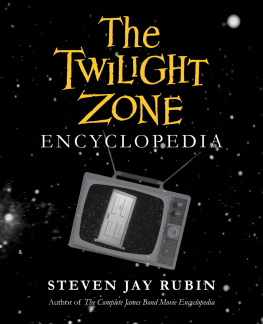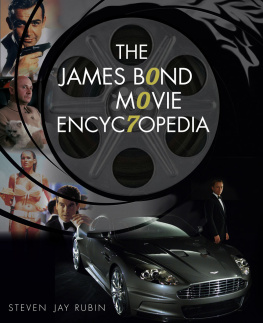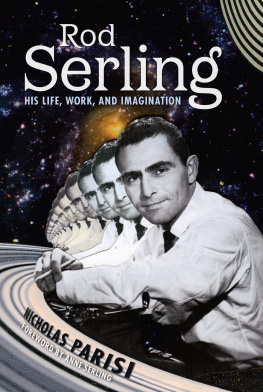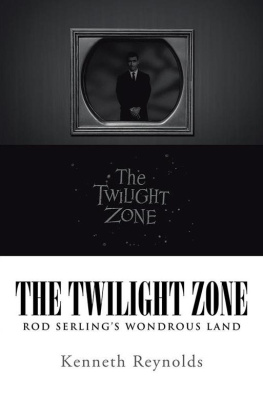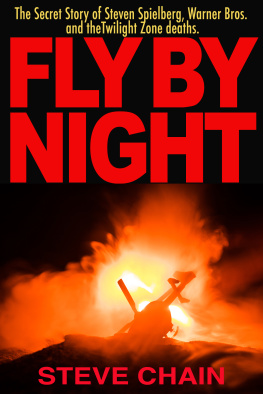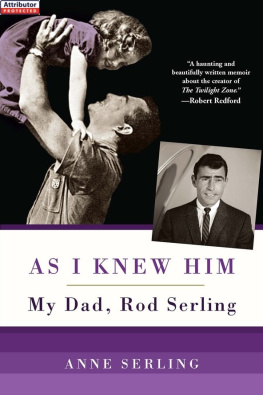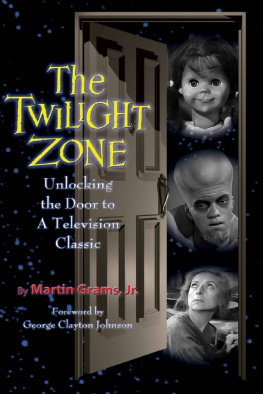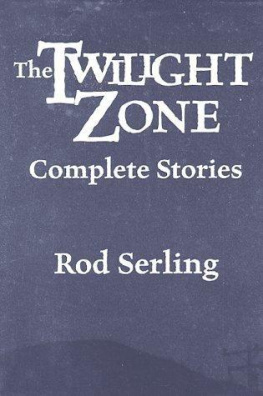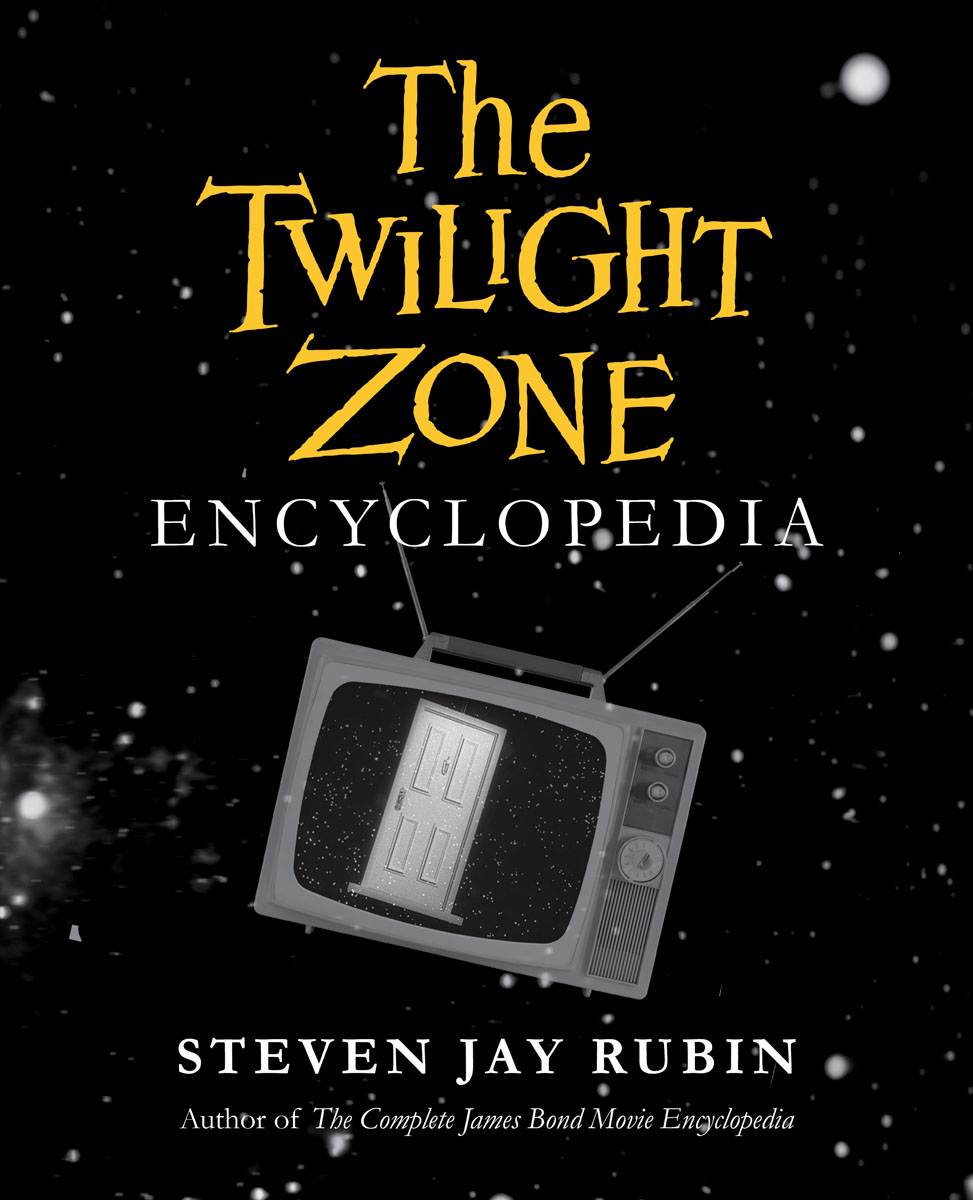
Copyright 2018 by Steven Jay Rubin
All rights reserved
Published by Chicago Review Press Incorporated
814 North Franklin Street
Chicago, Illinois 60610
ISBN 978-1-61373-888-7
Library of Congress Cataloging-in-Publication Data
Is available from the Library of Congress.
Cover design: Rebecca Lown
Cover image: TV image via Shutterstock; inset still from The Twilight Zone
Interior design: Jonathan Hahn
Printed in the United States of America
5 4 3 2 1
INTRODUCTION
S ubmitted for your approval, the state of the world in October 1959: With the space race in full swing, the Soviet Lunik 2 spacecraft becomes mankinds first visitor to the moon when it crashes on the lunar surface. Meanwhile, the United States launches a Little Joe booster rocket carrying a model of the first capsule designed for manned spaceflight; the Explorer 6 satellite transmits the first TV pictures of Earth; and the X-15 rocket plane flies under its own power for the first time, reaching a speed of 1,400 miles per hour, or twice the speed of sound.
Meanwhile, back in earthbound Southern California, Soviet premier Nikita Khrushchev is furious about being denied admittance to Disneyland for security reasons. And Hollywood pundits are touting the season of the television detective as last years hit series 77 Sunset Strip spawns copycats Bourbon Street Beat, Surfside 6, and Hawaiian Eye. Movie fans are preparing for the world premiere of director William Wylers Ben-Hur, which with a budget of $15.9 million is the most expensive movie of all time.
As the citizens of Earth turned their attention to the skies and to their small and big screens that fall, at 10:00 pm eastern time on the evening of Friday, October 2, 1959, the world of pop culture was about to undergo a seismic shift. Thats when 34-year-old writer/producer Rod Serling and the CBS Television Network introduced a new dramatic anthology series focusing on what if tales of speculative fiction: The Twilight Zone.
Speculative fiction, encompassing the genres of science fiction, fantasy, and horror, did not begin with Rod Serling. Long before The Twilight Zone, 19th-century writers from Mary Shelley and Edgar Allan Poe to Jules Verne and H. G. Wells first fanned the flames of imagination to create heroes and monsters and exotic worlds that entertain us to this day. And in their footsteps came such giants of 20th-century genre writing as Isaac Asimov, Robert A. Heinlein, Arthur C. Clarke, George Orwell, Ray Bradbury, Kurt Vonnegut, Ursula Le Guin, and Philip K. Dick, who carried the banner to contemporary audiences, carving a lasting place in American pop culture.
However, it was Rod Serling and his thought-provoking allegorical stories that expanded the reach of speculative fiction beyond the printed page. In 1959, science fiction, fantasy, and horror films and television shows got little respect from critics, and adult audiences dismissed them as kids fare. Networks and studios were reluctant to invest much money or high-profile talent in what was considered second-rate entertainment. There were exceptions, of course. MGM spent serious studio dollars on the sumptuous Forbidden Planet in 1956, as did Universal on This Island Earth (1955) and The Incredible Shrinking Man (1957), and Paramount on The War of the Worlds (1953). RKO Pictures had The Thing from Another World (1951), 20th Century Fox had The Day the Earth Stood Still (1951) and The Fly (1958), and Columbia Pictures fell for a stop-motion animation genius named Ray Harryhausen and financed The 7th Voyage of Sinbad (1958). But overwhelming these A-list titles were literally hundreds of cheap exploitation films that enchanted young people at matinees yet hardly showed up on the radar of serious critics and adult filmgoers. Roger Corman and American International Pictures were making money hand over fist with genre films, but they werent landing very high on the pop culture index.
Take my family, for instance. While I was parked at my local theater every Saturday morning devouring every genre film in creation, my parents sought out what they perceived to be more sophisticated fare: Dad watched westerns, dramas, and war pictures, and Mom loved star vehicles, musicals, and romantic stories. We were all ardent moviegoers, but we just didnt appreciate the same things.
On television, meanwhile, the pickings for genre fans were pretty slim. The earliest genre programs were inspired by the movie serials of the 1930s and 40s, and also geared for children: Rocky Jones: Space Ranger, Tom Corbett: Space Cadet, Tales of Tomorrow, and Superman starring George Reeves.
The Twilight Zone, on the other hand, was hardly something for the kiddies. Its creator was a serious dramatic writer, a three-time Emmy Awardwinner. Yet Rod Serling had come west to Hollywood frustrated and angry, fed up with network and sponsor interference in his desire to tell morally responsible stories. He saw an opportunity to sell a television series that on the surface would avoid controversial issues and appear entirely palatable to the broadest possible audiencewhile in reality it would tell the same morality tales that he hadnt been able to sell to live television.
The key was that this time the controversy would be camouflaged by the wonderfully imaginative genre elements he and the shows other writers brought to the table. Instead of telling the story of blacks and whites battling over racism in the Deep South, he introduced a woman who is desperately trying to fit into a society where pig-faced uglies think theyre the beautiful ones. Instead of condemning the totalitarian impulses of our own society, he imagined a fictional world in which books are outlawed and a kindly librarian is told that he is the obsolete man and must be put to death. And rather than providing a straightforward meditation on the pain of war, he gave a gung ho American officer in the Philippine Islands during World War II the chance to change his ways by literally stepping into his enemys boots. In this way Serling was able to tackle such taboo subjects as the Holocaust, environmental disasters, the dangers of automation, capital punishment, and the first casualties of the Vietnam War.
The Twilight Zone quickly became one of the most relevant television series of all timeand simultaneously one of the most entertaining. Its as timeless today as it was upon its debut in 1959.
And thanks to the unprecedented contract Serlings representatives at the Ashley-Steiner Agency negotiated with CBS, he achieved something rarely given to writer/producers: total creative control over the series. His triumph opened the creative sluice gates for many other writerssome of whom sold episodes to the show, and others who found greater freedom to create their own TV series and movie projects thanks to his pioneering work.
Serling proved that there are no limits to imagination. His speculative worlds werent as outrageous as some other writers, but he wasnt afraid to tackle difficult concepts, and he expanded the limits of acceptable television subject matter in a hundred different directions. He eschewed tradition at times, and he embraced it at others. He wrote about children and he wrote about senior citizens; he chronicled the plight of soldiers in combat, and he followed pressured advertising men as they drank their way home. He championed the common people, documenting their daily struggles. And other writers followedwordsmiths who took no prisoners with their story structures or choice of verbiage. Serling had taken the gloves off, stormed the breach in the wall, and won a decisive victory. He paved the way for others to do the same. Those that succeeded him took the question of What if? to new heightsand continue to do so to this day.
Next page
